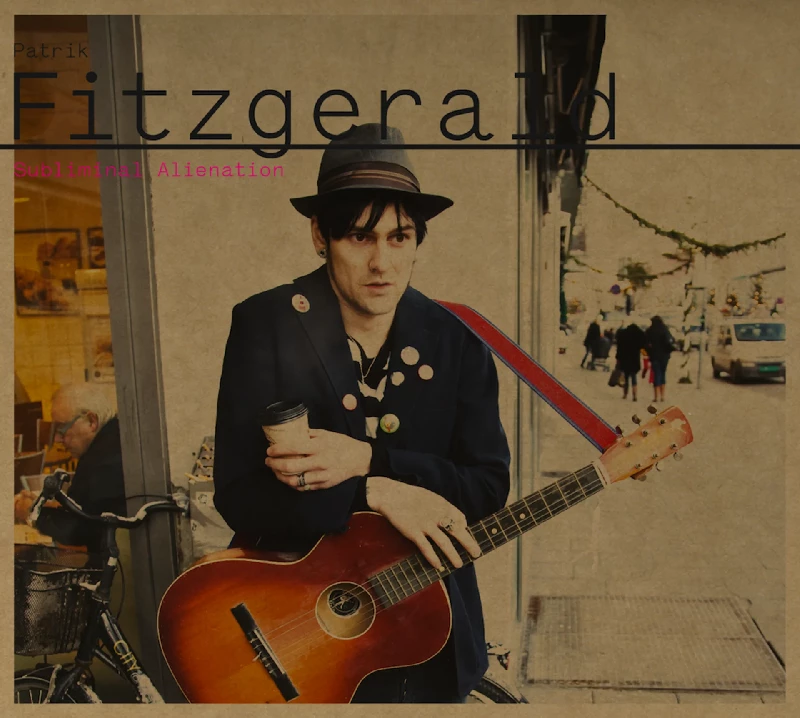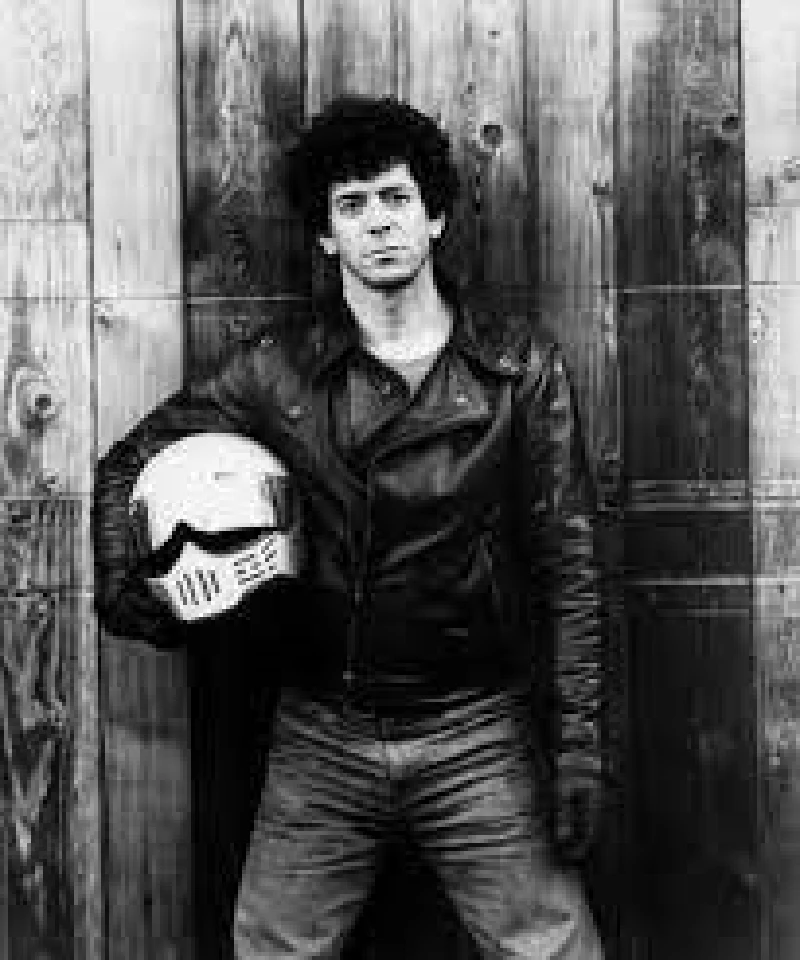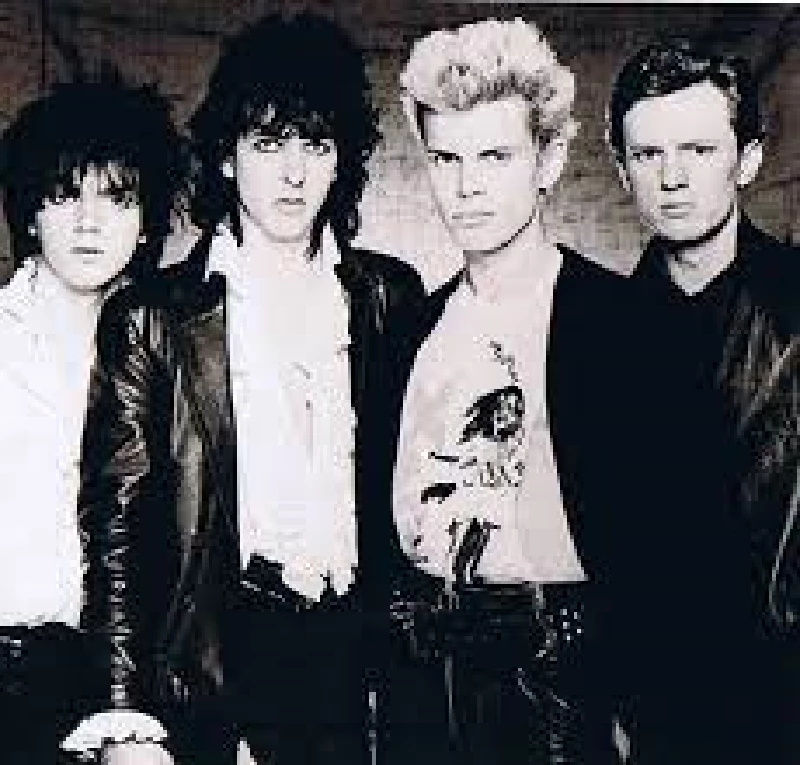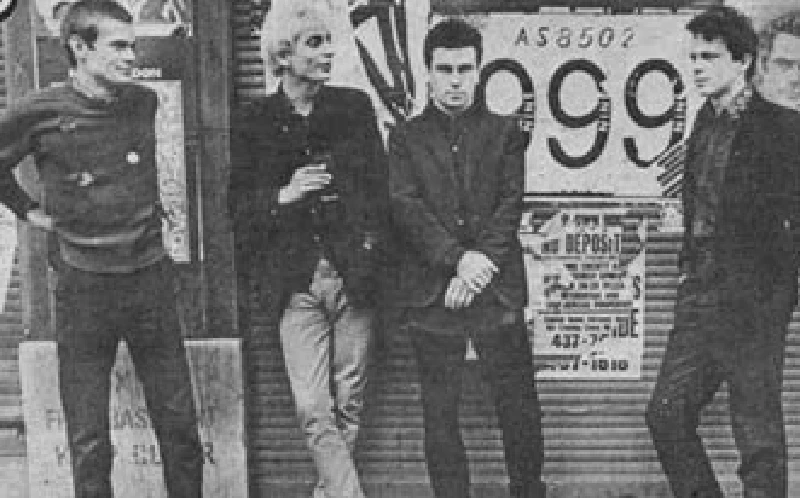In Dreams Begin Responsibilities - Music and Mental Health: Don't Talk To Me About Work
by Steve Miles
published: 26 / 11 / 2022

intro
‘In Dreams Begin Responsibilities’ Steve Miles looks at the world of work, and with reference to Lou Reed, The Ramones, The Fall, Generation X, 999 and Patrik Fitzgerald, asks why so few songs have otherwise been written about it.
‘A perfect day to get out of bed/ Shower, dress, shave, kiss you on the head/ Then I hit the office and my head starts to swim…Don't talk to me about work/ Please don't talk to me about work’ (Lou Reed, ‘Don’t Talk To Me About Work’ from the album ‘Legendary Hearts’,1983.) I love Lou Reed, obviously, but I was saving up writing about him for the future (I still am), and I certainly didn’t intend to open my account with this mid-level effort. But as the song gave me the perfect title for this issue’s article, I had to go with it. It’s not nearly as facile and futile a song as a ‘Banging On My Drum’ or an ‘I Love You Suzanne’, but he obviously hasn’t put too much effort into it either. He has, however, done what he was best at and put himself into someone else’s shoes, using the words they might use without judgement or editorial input. Still, it’s no ‘Candy Says’ for insight into someone’s soul, nor a ‘Romeo Had Juliette’ for social comment. He hasn’t tried hard to get rhymes (dirt’ barely qualifies as even an imperfect rhyme for ‘work’) nor has he bothered to find a decent synonym for ‘speak’ to avoid repetition, but the first verse has a bouncing musicality to it nonetheless, and the alliteration of ‘s’ helps it fly along like the morning rush it depicts. Whether this opening verse is a sly nod his own famous 1972 masterpiece, ‘Perfect Day’, is hard to tell, as, after all, the voice of the song is a tired and middle aged, married New York office worker, not Reed himself, as in the earlier song: ‘But even on the street/ When I hear a phone ring my heart starts to beat/ When I get home/ I don't want you to speak/ Don't talk to me about work.’ The track has one of those trademark marvellously Reed-esque sour notes, when the protagonist exclaims that it’s ‘A perfect day to just walk around… [and] See a violent movie.’ In Lou Reed’s world we’re all flawed and even his Eden has violence in it. Or is this again a wry nod to Perfect Day’s, ‘Then later, a movie too and then home’. That movie was surely more likely to feature Ali MacGraw than Al Pacino? ‘How many dollars, how many sales/ How many liars, how many tales/ How many insults must you take in this one life?’ The violent movie is just an illustration of the rage that work makes his character feel. Work demeans, frustrates and angers the protagonist – he needs the ‘video violence’ celebrated in Reed’s subsequent album to cope with how it makes him feel. Work also destroys the protagonist’s relationships, even though that relationship is a key part of why he is working in the first place: ‘I'm in prison most of the day/ So please excuse me, if I get this way/ But I have got obligations to keep/ So be very careful when you speak.’ Musically, the song is a suitably belting subway train of relentless rhythm and a lead vocal that works hard to give emphasis to the meaning, with a notable simplicity, even for Reed - a basic verse/chorus structure, no defined lead guitar, no backing vocals and no colour, but it is pointed, it is economical and it does fade out after just over two minutes. Lyrically, this song is a curiosity, not just in Reed’s oeuvre but in music generally, because it’s a song about daily labour, and that’s why I’ve started this article with it, because today I am writing about work in music. (Actually, Reed deserves to lead on the topic anyway, as the man who, singing live, quipped, ‘just watch me now’ after the line ‘other people, they have to work’ in ‘Sweet Jane’, from ‘The Velvet Underground, Live 1969’, released in 1974.) This article is about the topic of work in music, and the really curious fact that given that so many of us spend so much of our days, weeks and years at work, so very few songs are written about it. I had to think hard to find the source material for this piece. Even though the bulk of most people’s days are spent in employment, almost every song ever written is about the time not spent at work and not spent asleep. Almost all the songs we have are about that one third (max) of the day where, on the face of it, people are free to choose how to spend their own time. Put like that, of course, it makes sense that the time people cherish is the time celebrated in song. But on the other hand, that free time is dearly bought by the sweat and tears of our enforced employment for the rest of our lives, and it is all the more surprising that so few songs explore the world of work when you consider how defined we are by our labour. When we are introduced to people or introduce ourselves to them, it is almost the first information that most people ask or offer. What do you do? I’m an Amazon driver/ I'm a teaching assistant/ I’m an electrician. Who are you? I’m a key worker/ I’m a paramedic/ I'm a guitarist in a rock band. Very few people introduce themselves by saying, ‘I am a very keen drinker’, or ‘I devour box sets’, or ‘I like skateboarding’ even if they do that more than anything else and derive the most pleasure from it. No, we say we are what we get paid to do. Yet there are tens of millions of songs about leisure and relationships, and barely a handful of songs about daily labour. Perhaps there are two main reasons why there are so few songs about work. The first is because the producers of most songs don’t work themselves. Well, they work, but they don't work in a sphere that they could write about extensively and interestingly then sell to other people. They don’t have the kind of jobs which they could explore in a way that other people would be able to connect to. That said, there is, in fact, a disproportionately large sub-genre of music about being on the road, being in bars, having groupies and taking drugs - songs about the perils of being famous and the excesses of the rock lifestyle - but these exceptions prove the rule. Because very few people are born rockstars, and most of them have had some sort of paid employment on the road to stardom that didn’t involve six strings and spandex, and yet so very few of them write about that. I can probably count on the fingers of one hand the great ballads written by the biggest rock, pop and metal heroes of our times about the years they spent unloading pallets in warehouses in Middlesbrough or clocking on in call centres in South London before their music took off. Why is that? Have they forgotten what it was like to be a low skilled and underpaid worker? Do they not consider that to be suitable material for MTV? Or is it that they don't want to shatter the illusion that they are somehow more special than the rest of us? Whichever it is, the songs of the nine to five that preceded fame and fortune are hard to find. Perhaps, though, that’s just an inevitable part of the yellow brick road to celebrity? Is this lack of pre-fame-material simply part of the same urge to forget your roots and leave your authentic selves behind that made the Arctic Monkeys forego their legitimacy in the quest for photoshoots in the Nevada desert, at the same time losing all that made them worthwhile? That urge that that tore away the sounds of the scorching Southern heat in the Kings of Leon’s frantic formative output and replaced it with the platinum-selling, supermodel-dating hologram of commerce they became? Maybe so. But it is almost certainly the case that the producers of songs, the bulk of whom are concerned with maximising revenue, suspect that people precisely want to forget their own work while they’re listening to songs. Nobody goes clubbing to hear the latest RnB classic about stacking shelves, do they? The garage mechanic, wiping her oily hands on her overalls while she squints under the ramp at another rusted chassis is perhaps unlikely to want Galaxy FM to regale her with songs about the motor trade. It’s the same principle that inspires TV executives to set dating shows on tropical islands with luxurious apartments, swimming pools and wondrous views rather on than the streets of Britain where life really happens. Make us forget. Whatever the reason, it remains quite remarkable that so little music reflects what is such a big part of life for all of us. In the modern era most smaller bands and songwriters actually have to combine working with performing, and yet those day-to-day experiences of how they pay their way still rarely enter into their output. People who work in the NHS tell me that the levels of anxiety and unhappiness in what should be a rewarding and fulfilling occupation are off the scale. Statistics, surveys and whistle-blowers alike routinely reveal that most public sector jobs are depressing, dispiriting and damaging to people’s wellbeing, and I’m pretty sure that the public sector isn’t alone in that. So where on i-Tunes are the songs calling workers to action, the hits on Bandcamp detailing the stress, exhaustion and demoralisation of the day job? They're just not there. If you experience a particularly bad break up, you may well find yourself on the phone to your GP, looking for medical support. You may find yourself in the arms of various freely available non-prescription drugs too. And you will almost certainly also find yourself playing music on repeat, listening to breakup songs in the middle of the night until the tears run dry. We’ve all done that (you can’t beat 1990’s ‘Nothing Compares 2 U’ by Sinead O’Connor and REM’s ‘Everybody Hurts’, 1992, in my honest opinion) and we all know it helps. But when work pushes you to your knees, although the same medications and distractions are there for you as for your heartbreak, the songs simply aren’t. At the lowest point of my working life, when I was being bullied relentlessly by a boss I didn’t know how to stand up to, when I would physically shake on receipt of emails, when I would sink with sorrow at the sight of my laptop, when I would cloud over like Dementors were approaching as Sunday rolled by, it helped me a bit to play the loudest and angriest music I could find on my way to and from work, but there was NOTHING that addressed my problems directly. Music didn't save me in a way that engaged with the issues and the problems that I had, it only distracted me from them, and even then I had to play songs that raged about war or ex-lovers rather than angry songs explicitly about the kind of workplace cruelty, duplicity and incompetence that one vile man in a broken system inflicted on me and my workmates. The music of work wasn’t there for me. Funnily enough, if there is one song that does, albeit light-heartedly, hit the right nerve for me on this topic, it’s by those intellectual heavyweights, The Ramones. ‘Five o'clock rolls around/ Feel so great I kiss the ground/ Ain't enough hours in the day/ Got to be a better way// I can't take this crazy place/ I've become a mental case/ Yeah, this is the job that ate my brain.’ (‘The Job That Ate My Brain’.) In this, the second song on their twelfth(!) album (the otherwise quite forgettable ‘Mondo Bizarro’, 1992), the Ramones push the boat out to six chords to capture a near-perfect piece of patented punk-pop (perhaps precisely because this track was co-written with a non-Ramone trying to capture their trademark vibe) and buzz their way through just over two minutes of sneering, not-too-serious angst: ‘Go to work, it's such a drag/ Face the boss, he's such a nag/ In a suit and in a tie/ I look so lame I wanna die// I can't take this crazy place/ I've become a mental case/ Yeah, this is the job that ate my brain’ The chorus is sung no fewer than six times in just 137 seconds. Repetition - the soul of crap work, and the Ramones alike. Repetition, repetition, repetition – well, that segues smoothly into Mark E. Smith, doesn’t it, a man who, unlike most of his punk peers, did allude to the monotony and dignity of manual labour alike on more than one occasion. I say ‘allude’ because the internet is full of people arguing whether it’s ‘Get off-uh Ind-uh Est-uh’ or ‘Get up for Ind-uh Est-uh’ and many more who’ll cite a pamphlet written by a witchfinder in 1832 as the source of MES’ inspiration for this lyric or that, and I don’t want to get dragged into any arguments. ‘This song was written round here and it’s for the people round here,’ he intones on one of the recently released and wrongly labelled live recordings so you can’t fault him for pragmatism. Smith isn’t one to sugar coat the experience of manual labour as he yells over Martin Bramah’s razor sharp guitar and leather-jacket backing vox, that ‘The crap in the air will fuck up your face/ Yeah, Yeah, Industrial Estate/ The boss can bloody take most of your wage/ Yeah, yeah Industrial Estate / And if you get a bit of depression/ Yeah, yeah Industrial Estate/ Ask the doctor for some Valium…’ (from the album ‘Live At The Witch Trials’, 1979) Smith didn’t manage to crack the professional celebrity code in his long career, almost certainly because he never made much of an effort to mould his muse to the marketplace, so there are in fact a handful of songs by The Fall that touch on the experiences accrued or noted by Smith in his pre-music working days, in contrast to most full-time musicians. He is said to have worked on the docks, and ‘Net. Cap. of 58 thousand pounds/ They sweat on their way down/ Grey port with customs bastards…’ is the accordingly detailed way he begins the comic rockabilly chronicles of ‘The Container Drivers’ on the Fall’s third album ‘Grotesque’ (1980). It took me from then until this very day to realise that the song itself obliquely references the Fall’s first punkabilly effort of earlier that year, the single ‘Fiery Jack’, in the verse that I now know goes, ‘F. Jack’s a distant relation/ Communists are just part time workers/ And there’s no thanks/ From the loading bay ranks’. ‘Fiery Jack’ was said at the time by Smith to be a portrait of himself in twenty years, but he’s also a docker of the sort that existed then, and a prototype of the ‘stalwart working man’ who ‘Sat and drank/ For three decades/ I'm 45’ (‘Fiery Jack’, single, 1980). Having said all that, I must confess that I have not come to this topic – work - with an open mind. I’ve only got the time and energy to write this because I’m on holiday now! ‘You know when you have to meet someone and it takes precisely ten seconds to realise you’re gonna hate ‘em? Well, that was pretty much how it was with me and normal paid employment.’ – Steve Jones (Sex Pistols), ‘Lonely Boy’ (autobiography) 2016, Chapter 8. Like Steve Jones, but with a very different upbringing and a few years’ age gap, I was persuaded in my early teens that work was at best a necessary evil, and at worst, the end of liberty. As a child - and I don’t think I’m alone in this, but that doesn’t make it alright - I lacked an understanding of my parents’ feelings, or their identity as human beings apart from in regard to their relationship to me. But that’s no excuse for the fact that I often said hurtful and unthinking things to them, and the worst of those comments still fill me with shame to this day. I don't know what age I was, but I would have been somewhere between 13 and 15, and I don't know how it came to pass, but I know that I said to my Dad’s face that I would, ‘Rather be dead than do what you do for a living’. He had worked his way up from teenage dockside dogsbody to Chief Personnel Officer at a local council, and to be honest I had no idea what he did all day, and I knew whatever it was, it didn’t really hurt anyone, but that didn’t seem to matter to me then. I suppose at the time I felt that I was speaking on behalf of a greater concept – the notion of freedom. I could see that my dad lost a lot of himself at work: he had already used up all the energy he had each day by the time he came home to us at night, and had little left for us, and I could see that he drank quite heavily to relieve the strain it caused him. I could see the hours he forfeited aligning himself with artificial codes of speech, of writing, and of behaviour; the time he surrendered (albeit with real and thoroughly-deserved pride in his own skilled professionalism) to the meetings, minutes, and policies with which he had to engage. But I could also see the heavy price he paid for that pride and that success. Quite where I came to have such an aversion at such a tender age to work, and such a coldness to my dad’s identity outside of the family, is a mystery to me. I certainly felt that my secondary school was a place of pointless exertion, of carefully controlled hypocrisy and unfair authority, and I just assumed that work would be an extension of that. School for me was a place that crushed individuality and creativity, an institution established to foster and maintain everything that was wrong with the world, whilst my summers, spent with sawdust-filled nostrils in a small factory that laminated wood, and especially the square manilla envelope sealed with notes and coins that I was given every Friday for the time I spent there, by contrast seemed honest and transparent, but I didn’t want to spend my life doing it all the same. I guess I just assumed most people felt the same way. I grew up, after all, in the golden age of the British sitcom where labour was lampooned and looked down in equal measure. ‘Are You Being Served?’ – set in the kind of workplace I didn’t recognise at all - was populated by the most extraordinarily misogyny and equally gruesome depictions of toxic masculinity, which alongside the rest of the ‘family entertainment’ ‘served up’ in my formative years has left me struggling with my sexuality and gender identity all my life. ‘Porridge’ gave me a wily anti-hero with a heart of scuffed gold who was entirely devoted to the avoidance of work. ‘The Good Life’ gave me both kinds of middle-class aspirations to choose between, the wealth-driven and the culture-driven but it sided with the ones who’d jacked in the rat race. ‘Citizen Smith’ gave me a Beano-level caricature of a socialist beatnik, but he still seemed cool to me as he claimed the dole and spouted lazy left cliches. I couldn’t see as a kid that he was the butt of the joke any more than I understood why canned laughter followed Mrs Slocombe’s mention of her pussy. But above all, ‘The Fall and Rise of Reginald Perrin’ gave me catchphrases galore to trade with my mates in the classroom the next day and a clear-eyed post-mortem of the futility and insincerity of the suit, train and mortgage lifestyle that must surely have stoked my cruel and unforgivable rejection of my own father’s sacrifice and devotion. I wasn’t alone, though. William Broad, better known as bleached-blonde Billy Idol, was a bit older than me but he got the same message growing up: ‘Don't wanna spend my life saving up for things/ I don't wanna have what a steady job brings/ I don't want security/ Don't want responsibility//…Never wanna be an adult/ Always wanna be in revolt.’ – Generation X, ‘Youth Youth Youth’, the defining final track of their debut album, 1978. Older-still, brothers Nick Cash and Guy Days of dayglo-punksters 999, had already nailed their proto-punk preconceptions to the mast with their first single a year earlier, a ‘No Future’ anthem that may have been sincere or may have been train-jumping, but spoke with pub-rock panache for most punks nonetheless when they sneered, ‘Don't like petty bureaucracies and detentions/ Don't wear those funny clothes/ Get in the scheme of pensions/ Do the same thing every day/ I can't stay up too late/ Watch out for me now ‘cos/ I’m alive…’ (‘I’m Alive’, 1977) So it was with me. Looking back, it's quite extraordinary that around, or not long after, the era of the three-day-week and the early days of punk, so much mainstream British television was ostensibly also questioning the nature of the nine to five. Oh, hey, ‘9-5’ - that rings a bell… Of course, Dolly Parton’s famous song about women in work. Aimed at getting equality for women in the workplace, if it wasn’t written as the centrepiece of a Hollywood blockbuster, this might have been an exception to my theme. It’s not my sort of music but the words seem heartfelt enough and by all accounts she’s a sincere and caring person. ‘They let you dream/ Just to watch 'em shatter/ You're just a step/ On the boss-man's ladder/ But you got dreams/ He'll never take away…’ (Dolly Parton, ‘9-5’ from the movie of the same name, 1980). Speaking of songs with numbers in them, if you’ve never heard it, do please make the effort to devote 1 minute and 38 seconds of your time to ‘32 Weeks’, one of three tracks on the Mekons’ lo-fi first single from 1978. It’s an absolute classic, untouched by time, which starts off with an overexcited singer shouting ‘1-2-3-4’, followed by a couple of seconds of lumpen chords at a breathtaking speed, which then just as quickly cease as several muffled voices shout ‘Stop’. A distant (drummer’s?) voice grumbles ‘It’s too fucking fast’ and someone else says ‘Sorry’, in an all too English way. Then it starts again. But slower. It’s still all over long before two minutes though. The lyrics build on the notion of the time that you trade in your work for what you buy. ‘It takes 32 weeks of your life to get a car… Get a job, get a car/ It takes one week of your life to buy a mattress… It takes 2 hours of your life to buy a whisky/ 45 minutes/ Get a job/ Get a car/ Get a bed/ Get drunk.’ The singer ends by yelling that the winner of the ‘weekly fifty thousand pounds savings bond prize’ ‘lives in Hull’ – superbly explaining in the most succinct way possible the attraction of the lottery and the betting shop for working folk – ie, the dream of money not swapped for time. Five years later, in the same year, oddly, that Uncle Lou released the track that started this piece, an almost-certainly lonely Londoner in his late twenties recorded a brief poem, intoned resentfully over a cheap Casio-setting backing track, called simply ‘Work’ as part of his second album: ‘I will not work for you, to earn a living/ Life is something you are born with, not just something you’re granted.’ And with that (spoiler alert), we journey to some very dark places indeed… As we have established, my political and emotional aversion to work dictated that I spent pretty much the whole of my late teens and twenties avoiding paid employment. I was poor, undeniably. Depressed, certainly. Lonely, undoubtedly. But I wasn’t - or so I felt - part of the system (or ‘shitstem’ as the Rastas called it at the time). I sincerely believed then - and still do really - that if you’re not part of the solution you’re part of the problem. And whilst I clearly hadn’t managed to become in any way part of the solution, I felt that the least I could do was try not to be part of the problem either. But I needed someone to tell me that was OK. And Patrik Fitzgerald did that better than anyone. If I needed confirmation that work was not for me, I only I had to listen to the early Polydor single, ‘All Sewn Up’ (1979) where, to a breathless concentric acoustic thrum like an indoor tornado (the ‘demo’ of it later released later on several compilation CDs, presumably to avoid licensing from Polydor, is actually better by far) he completely unpicks capitalism in a few biographical lines: ‘When you were a boy you always wanted to be someone/ You knew you never would be when you thought about it lunchtimes/ An ordinary job – not what you wanted/ What you got though/ It’s not enough/ It’s never enough… From criminal to popstar/ You’ll be captured every time/ It’s all sewn up you see/ With stitches so fine/ That you can’t see them to unravel.’ Fabulous stuff, and much more punk than many of the original punks. If Steve Jones could have written and read at the time, he might have penned something similar. But after the ridiculously fluent guest drumming of John Maher on that first album had disappeared, along with Polydor’s backing, Patrik’s music turned inward along with his anger, and the depictions of daily life grew darker still. We’re all flimsy moths pulled inexorably to our own personal flames and I was an alienated young man looking for validation and comradeship of feeling. Patrik Fitzgerald gave me that in spades, though of course we never met. Famous for one sarcastic novelty fake punk song, he was briefly adopted by a major label as referenced above, made an album (‘Grubby Stories’, 1979) that was half brilliant and half not, then fell back into indie originality. His second album, made, I suspect, entirely by himself, and infused with the dark tones of a lonely young man in a flat above a shop at 4am, was not released until three years later. It was ironically called ‘Gifts and Telegrams’. ‘Drifting Towards Violence’ followed a year later, taking the darkness further still. These records gave voice to my alienation, put chords to my despair, and accorded a cheap drum machine’s pneumatic puff to my loneliness. ‘Gifts And Telegrams’ opening song begins thus: ‘He put his shoulder to the wheel/ And turned his back against the world/ Spoke his mind too many times/ Opened his mouth a little too wide/ They’re going to put you in the gas chamber, sonny/ Strap you in to the electric chair/ They’ll tie you on to the rack/ With paving stones upon your back/ With your friends on the top/ To crush you quicker…’ and that’s one of the more uplifting songs. Really, it is. ‘I say life is pointless, worthless and meaningless/ You say, well, try suicide… – ‘Solve’, track seven. It finishes with ‘Island of Lost Souls’, a beautiful reverb drenched ode to despair. I listened to those songs until I knew them off by heart. I wasn’t alone. Or was I? Was it making me more lonely? If I hadn’t had the likes of Patrik in my ear telling me my grief was OK, my loneliness noble, my hopelessness worth singing about, might I have listened to happier, more positive voices instead? I don’t know. If girls who like not to eat couldn’t go on websites that post photos of the gaps between each other’s thighs with measurements to compare their respective weight losses, would they get healthier more easily? If teenagers who cut themselves couldn’t get tips on how to hide the cuts and how best to make the blood flow on their phones, might they have fewer scars to heal? Again, I don’t know. But I can’t help but wonder in hindsight whether if I couldn’t have listened to Patrik singing, ‘Give me a wife and a home and a family/ A nice steady job, a nice steady income/ A car at the front and lots of friends/ On second thoughts, just don’t bother’ (‘Straight Boy’, the B-side of his equally gloomy ‘Personal Loss’ single, 1982), might I have gone to the pub more, and maybe got a job I liked? He didn't plant the idea of depression in my mind, of course; indeed, it was me that sought him out. It was me that championed him not vice versa. But his records gave credence to my darkest thoughts and nourished my despair in ways which… well, maybe another article probably needs to explore. Of course, we’ll never know whether I’d have been happier if I’d never heard of him and had to listen to the Human League instead. The anorexic teens who post selfies for their online friends are only acting from their own pain: Patrik Fitzgerald, I assume, was doing the same. He didn’t write those songs for fame or fortune, but because he hurt. It’s not his fault I bought them and used them as a crutch. And then there was the almost-vanished-without-trace sister-record to ‘All Sewn Up’, the slower, picked, pretty, caustic ‘Popstar, Popstar’ released in 1981 under a pseudonym, that makes my harsh words to my dad seem reasonable and kind, and which details his pre-punk working life in more grim detail than any other song before or since. ‘My father worked for thirty years in a factory/ What did it do? It killed him/ What did he get? Not very much: a wife, a home, my sister and me.’ Now, if you ask me today what I have achieved in my life, I would still not mention anything to do with work. So I’m still on Patrik’s side there. But I would definitely NOT lump my family in the ‘not worth it’ column beside my jobs! On the contrary, my home and my family are pretty much the whole of the ‘worth it’ category, and there’s top of it, for sure. But at the time, I pencilled those things (the ‘Straight Boy’ things) into the ‘avoid’ list at Patrik’s suggestion, and it took me a long, long time to rub them out and add them to the plus side instead. So, yes, I blame Patrik Fitzgerald for my unhappy twenties. And of course, it wasn’t his fault. He still holds the title for having written far and away the best song ever on the topic of the ‘art for art’s sake/ success’ argument, the absolute touchstone of why you shouldn’t ‘sell out’, the beautiful and moving ‘All The Years of Trying’ from his first LP. But then my Dad had the last word, after all, to both of us, when Patrik was on some late night TV youth show once and I made my dad stay up late to watch it. Fitzgerald bashed through ‘Bingo Crowd’ with an angry sneer and I turned in awe and happiness to my Dad, as much as to say, ‘See, that’s why punk matters – that’s how we’re changing the world.’ My dad said, ‘The people that song’s about aren’t watching this programme, so it’s not going to change anything, is it?’ and that was punch to my stomach that I still feel to this day. I didn’t have an answer then, and I don’t have one now. Anyway, that’s me and work and my mental health in music in a nutshell for you. I’m sure I’ve missed a lot of suitable songs out, but I’m no less convinced than when I started that work is a woefully under-represented aspect of life in the medium of popular song, so I don’t think that any songs you can think of that could have fitted here are going to run into the hundreds, let alone the thousands, even though Spotify adds tens of thousands of new songs to its lists every day. A final, top-notch honourable mention must go the troubadour of trouble himself, Wreckless Eric, who in his experimental home-recording autobiographical days, recorded one album under his real name, Eric Goulden, called ‘Karaoke’ which included a song from exactly the other end of the employment spectrum – the post-pop labour market. Unique in his take as ever, and infinitely more eloquent than his accent suggests, Eric’s ‘Big Wheels Don't Wear Cheap Suits (Incorporating Shirt, Tie & Golfing Jacket)’ can’t be summarised in print. It has to be heard, if you can track it down and don’t mind the dustbin-lorry-knocks-over-half-the-road soundtrack, because it includes a long, witty and typically self-deprecating spoken narrative recounting the period in the author’s life when ‘It was time to jack it all in and get a job, so I went down to the Oxfam shop and got a set of the sort of clothes I thought blokes that went to work might wear, and then I hit the job centre. It was harder than I thought it would be. It hadn’t occurred to me that I would be expected to account for the last ten years of my adult life. It hadn’t actually occurred to me that I was even an adult…’ And I can’t leave without noting that there is one song I own which is called, simply, ‘Work’, and which is one of the very greatest songs ever. From that information, you might expect that song - the second single released by the Blue Orchids in 1980 – to have taken centre stage here. But it’s not about paid labour at all. In fact, it’s about the opposite, I believe. About the life of the spirit. So it’s not for this column today, but for a future column about the opposite of work. Funny, that.
Also In In Dreams Begins Responsibilities
In Dreams Begin Responsibilities (2024)
In Dreams Begin Responsibilities (2023)
In Dreams Begin Responsibilities (2023)
In Dreams Begin Responsibilities (2023)
Article Links:-
https://www.youtube.com/watch?v=UL_0CTpEh00https://www.youtube.com/watch?v=B7qiK-w81iU
https://www.youtube.com/watch?v=B7qiK-w81iU
https://www.youtube.com/watch?v=MRuV1WlIElo
https://www.youtube.com/watch?v=MO55yKeofiw
https://www.youtube.com/watch?v=dzbXmzgw3cQ
Play in YouTube:-
Picture Gallery:-





most viewed articles
current edition
Carl Ewens - David Bowie 1964 to 1982 On Track: Every Album, Every SongArmory Show - Interview with Richard Jobson
John McKay - Interview
Colin Blunstone - Thalia Hall, Chicago, 16/7/2025
Bathers - Photoscapes 1
Billie Eilish - O2 Arena, London, 10/7/2025
Visor Fest - Valencia, Spain, 26/9/2025...27/9/2025
Loft - Interview
Sir Tim Rice - Interview
Robert Forster - Interview
previous editions
Manic Street Preachers - (Gig of a Lifetime) Millennium Stadium, Cardiff, December 1999Heavenly - P.U.N.K. Girl EP
Beautiful South - Ten Songs That Made Me Love...
Peter Perrett - In Dreams Begin Responsibilities Interview Part One
Boomtown Rats - Ten Songs That Made Me Love....
Oasis - Oasis, Earl's Court, London, 1995
Trudie Myerscough-Harris - Interview
Coldplay - Wembley Arena. London, 16/8/2022
Prolapse - Interview
Pixies - Ten Songs That Made Me Love...
most viewed reviews
current edition
Davey Woodward - Mumbo in the JumboSick Man of Europe - The Sick Man of Europe
Lucy Spraggan - Other Sides of the Moon
Phew, Erika Kobayashi,, Dieter Moebius - Radium Girls
Suzanne Vega - Flying With Angels
Bush - I Beat Loneliness
Amy Macdonald - Is This What You've Been Waiting For?
Alice Cooper - The Revenge of Alice Cooper
Blueboy - 2
Cynthia Erivo - I Forgive You
Pennyblackmusic Regular Contributors
Adrian Janes
Amanda J. Window
Andrew Twambley
Anthony Dhanendran
Benjamin Howarth
Cila Warncke
Daniel Cressey
Darren Aston
Dastardly
Dave Goodwin
Denzil Watson
Dominic B. Simpson
Eoghan Lyng
Fiona Hutchings
Harry Sherriff
Helen Tipping
Jamie Rowland
John Clarkson
Julie Cruickshank
Kimberly Bright
Lisa Torem
Maarten Schiethart
